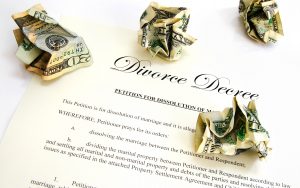If your marriage is ending, you have likely wondered what will happen to your retirement savings as a result of your divorce. In short, divorce doesn’t have to derail your savings. Here’s what you can expect in Northern Virginia.

Divorce
Divorce can be very disruptive, if not devasting, obviously both emotionally and to your retirement. This is particularly true for people age 50 and older because spouses are at risk of losing a significant portion of their retirement savings. Furthermore, they typically have a shorter window remaining to replenish the accounts.
Divorce requires both parties to adjust, but the spouse with the lower income will usually have to adjust more. Before you move forward with a divorce, we recommend you step back, regroup, and re-strategize your retirement plans.
Qualified Domestic Relations Order
If you’re dividing assets in an employer-sponsored retirement plan between spouses, it is crucial that you obtain a Qualified Domestic Relations Order, or QDRO. This is an order that is required for qualified plans to pay out to nonparticipants. It is the only way to get a payout from a 401(k), pension plan, or similar plans if you are not the spouse who owns the 401k.
These orders must be written in a certain way to be accepted. This may involve very specific rules. Since these orders are very complex, it can be expensive and time-consuming to have an attorney draft them. An alternate, more cost-effective option is to employ an actuary who specializes in writing QDROs.
Social Security Spousal Benefits
Divorce doesn’t mean you lose out on Social Security spousal benefits. If you were married for at least 10 years and have not remarried, you are entitled to receive retirement benefits from your ex-spouse’s Social Security account.
Your spouse needs to be at least 62 for you to begin claiming benefits. If you claim early, at age 62, you will permanently receive a reduced amount. But if you claim at your full retirement age, you will receive an amount equal to one-half of your spouse’s full retirement benefits. However, unless your spouse is already receiving Social Security benefits, you must wait two years after your divorce to begin payments. Furthermore, claiming these benefits will not affect your ex-spouse’s retirement benefits or those of anyone he/she may marry after you.
Take an Inventory of Investments and Assets
Once you have an idea of what, if any, retirement funds you will receive from your ex-spouse, you need to take a full inventory of your assets. It is important to review and verify this information prior to your divorce. Maybe your spouse was the one who handled finances and you don’t know where things stand. Whatever the case, now is the time to familiarize yourself with your accounts and consider their tax implications. If you need help understanding things, you should seek advice from a financial advisor.
Updating Your Retirement Plan
After your divorce, you need to review your retirement plan and consider whether it still meets your needs. You may need to adjust your portfolio to reflect your personal risk tolerance and expected retirement date. This is also a great time to update your beneficiaries on your financial accounts. This beneficiary designation takes precedence over your will and is critical in ensuring that your most recent preferences are reflected. So, unless you want your ex-spouse to receive your assets his/her name should be removed from all your retirement funds, life insurance policies, and other accounts.
Build Your Own Savings
If you have not done so, create a budget for your future finances. Be sure to build in an emergency fund to cover 3-6 months of expenses and set aside an adequate amount for retirement. Every person’s situation is unique, but it is best to have a written plan to outline your goals and the steps needed to reach them. This is where a financial planner can really help you to choose the right mix of retirement accounts and other savings and investment vehicles to help you meet those goals.
Lifestyle Changes
Divorce will often impact your lifestyle. You may need to make financial adjustments going forward such as downsizing the house, skipping or reducing vacations, or even changing jobs. This will ensure you can pay bills, stick to your budget, and save enough for your retirement fund.
While these changes can be overwhelming at first, having a positive attitude can help you come out of a divorce stronger. Having a plan and tracking your progress is a way to gain some control and focus on what may seem like a daunting situation. Remember that changes are opportunities for improvement.
[Additional Resources On Our Website for Divorce]
Or join us for our next Done with Divorce Seminar
Retirement and Divorce in Northern Virginia
If you are considering divorce, think about your retirement accounts and your long-term financial planning as well. Seeking the advice of professionals can make a big difference in this process. Contact Argent Bridge Advisors today to learn more!





